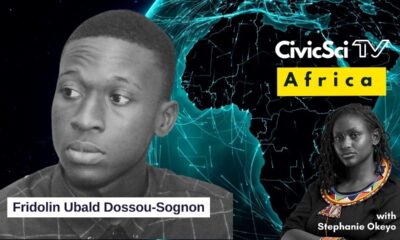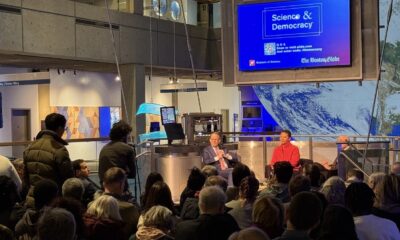Stories in Science Special Series
Debts and Lessons (in Science)
Colm P. Kelleher is a postdoc at Harvard University specializing in biophysics and soft matter physics. As well as research, Colm is interested in science communication and education. In this article, he writes about about the importance of mentors and role models in his scientific life.

Colm P. Kelleher
[su_boxbox title=”About”] Colm P. Kelleher is a postdoc at Harvard University specializing in biophysics and soft matter physics. As well as research, Colm is interested in science communication and education. He has published several Ted-Ed videos on physics and math, as well as a coloring book, Phases of Matter, based on his PhD research. Colm earned his BSc in Mathematics and Physics at the National University of Ireland, Cork in 2008, and completed his PhD in Physics at New York University in 2017.[/su_boxbox]
[dropcap]M[/dropcap]arcus Aurelius’ Meditations is one of the classic texts of ancient literature. In this short work, the part-time philosopher (his day job was Emperor of Rome) explains, via stern injunctions, grandfatherly advice, and pithy aphorisms, how to live a good life. Marcus was part of the Graeco-Roman “Stoic” tradition — a school of philosophy that emphasized practical wisdom over theory, the idea that negative emotions lie at the root of suffering, and the cultivation of self-control to minimize the harm of those emotions.

Colm P. Kelleher
To help themselves and their students in their quest to live well, many Stoics identified and studied role models — people they wish to emulate in one way or another. The first chapter of Meditations, called “Debts and Lessons,” is written in this spirit — the entire chapter consists of a list of Marcus’ role models and mentors, and a brief description of how he has benefited from the example, or the generosity, of each.
Although Meditations was written almost 2,000 years ago, the relationships Marcus describes in this chapter — to his father, mother, teachers, colleagues, and friends — feel very familiar, and most of his advice remains sound today. From Diognetus: “To hear unwelcome truths.” From The Literary Critic Alexander: “To not constantly be correcting people.” From Sextus: “Kindness.” Even when the specifics of the text remind us that the writer lived in a very different world (Diognetus again: “Not to be obsessed with quail fighting or other crazes like that”), the broader point remains valid — mentally replace “quail fighting” with “Instagram” and you have an instant update.
Re-reading “Debts and Lessons” recently, I thought about the importance of mentors and role models in my scientific life. Who have I been most influenced by, and how? What behaviors and attitudes have I identified in others that I try to recreate in myself? Who has given me an opportunity, or taken a chance on me, when others might not have?
So I decided to make my own list. Here it is.
- My father
For teaching me the value of facts — of seeking to see things as they are. For making me argue my point. For passing on his love of books. For believing in the nobility of service.
- P—
For his commitment to finding the truth — even if it’s not what we want it to be. (Or worse — if the truth is “we can’t measure this properly, so there’s nothing we can say about it.”) For taking ideas seriously regardless of who they come from. For his sense of duty to his students after they graduate. For explaining that the most impressive experiment isn’t the hardest one, but rather the simplest one that yields the most insight.
- D—
For combining great focus and scientific ambition with gentleness, care, and respect for his subordinates. For thinking and caring about writing well. For being conscious of his role in the lives of others, especially his students. For not being vain or egotistic, and allowing himself play second fiddle when that’s the most productive thing to do.
- R—
For his precision and rigor. For his total aversion to bullshit (especially mine). For the breadth and depth of his knowledge of both theory and experimental technique. For giving negative feedback when it wasn’t welcome, but was needed. For demonstrating forgiveness after arguments that got too personal.
- A—
For being a good scientist, while not taking things (or herself, or me) too seriously. For being a good friend as well.
- M—
For her never-ending curiosity exploding outward in all directions. For being a perpetual (and perpetually joyful) student. For treating children and young people with intellectual seriousness, and as a consequence being the best teacher I know. For demonstrating how to teach not just with style, but with compassion and even love.
- C—
For her self-belief, for taking charge, and for pushing — herself and everyone around her. For trying to do good in the world sincerely, effectively, and honorably. For (somehow, miraculously) always responding to emails right away.
- M—
For his energy, creativity, and wit. For insubordination and his willingness to be disrespectful, but only to those in positions of power or authority, and only when it’s deserved.
- S— & X—
For their boundless intellectual energy. For being personally open and professionally generous.
- W—
For his generosity with his time, and teaching me molecular biology even though he was busy and there was nothing in it for him.
- C—
For her tirelessness and good spirits in the face of professional adversity. For her commitment to enjoying the journey, and to doing a good job for its own sake. For giving me the single best piece of advice I received in grad school: “Always use your middle initial in publications.”
- The teachers I have had throughout my life
For sacrificing other opportunities — in many cases, the opportunity to make a lot more money — so I could learn from them. For their understated humor and intellectual honesty. For explaining to me, in good faith and as best they could, how the world works.
- The students I have had throughout my life
For treating me with respect — but not too much. For listening attentively and trying to understand what I was trying to say, for asking questions and being engaged. For being patient when I was confusing or underprepared, and for helping each other to learn. For never (or rarely) letting me get away with mental sloppiness.
Cover Image by StevoLeBlanc from Pixabay | Pixabay License
Metrics
Sessions
Total number of Sessions. A session is the period time a user is actively engaged with the page.
Visitors
Users that have had at least one session within the selected date range. Includes both new and returning users.
Page views
Pageviews is the total number of time the article was viewed. Repeated views are counted.
The CS Media Lab is a Boston-anchored civic science news collective with local, national and global coverage on TV, digital print, and radio through CivicSciTV, CivicSciTimes, and CivicSciRadio. Programs include Questions of the Day, Changemakers, QuickTake, Consider This Next, Stories in Science, Sai Resident Collective and more.

-
Audio Studio1 month ago
“Reading it opened up a whole new world.” Kim Steele on building her company ‘Documentaries Don’t Work’
-
 Civic Science Observer1 week ago
Civic Science Observer1 week ago‘Science policy’ Google searches spiked in 2025. What does that mean?
-
Civic Science Observer1 month ago
Our developing civic science photojournalism experiment: Photos from 2025
-
Civic Science Observer1 month ago
Together again: Day 1 of the 2025 ASTC conference in black and white
Contact
Menu
Designed with WordPress
























